The (ongoing) journey to the ‘All hands on deck’ card experience
The (ongoing) journey to the ‘All hands on deck’ card experience
CDKN’s Learning Lead, Lucia Scodanibbio, describes the evolution of the knowledge brokering reflection cards that have been developed to facilitate more dynamic, playful meetings that yet focus on serious issues. The cards have multiple uses, from being a tool to surface challenges, solutions or priorities, at an individual or organisational level, to being a game that can be played to share deeper reflections or conversations about what matters in our work.
CDKN’s recent interactions with diverse stakeholders have been showing a real thirst for more engaging, interactive and dynamic ways of running meetings and workshops that have the potential to furthermore create safe, non-hierarchical learning spaces. In this spirit, and as part of an ongoing journey with various partners, we developed the ‘All hands on deck’ cards to give us an additional way of enabling our stakeholders to discuss some of the critical elements needed for facilitating evidence-based decision-making and action, while having fun in the process.
The ‘All hands on deck’ cards were officially launched at the Adaptation Futures conference in Montreal in October 2023. They had only been a couple of months in the making and had been tested once with colleagues from the CDKN Africa team and a second time with a group of graduate students at the University of British Columbia’s School of Community and Regional Planning.
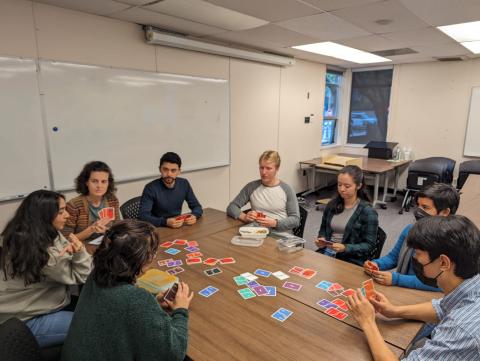
The idea first arose as I was reading a paper about principles for knowledge co-production by Noström et al (2020). The authors claimed that knowledge co-production needs to be context-based, pluralistic, goal-oriented and interactive. As I read about each of these principles, I could picture many sub-components and elements arising, both from the paper and in resonance with the learning work I had been undertaking about the approaches and strategies knowledge brokers use to promote evidence-based decision-making and action. I knew that our learning work was showing that to facilitate equitable, inclusive and transformative climate action, a number of elements and considerations have to be present and taken into account. These go from practical concerns like ‘roles and responsibilities’, ‘resources’ or ‘tools and methods’ to facilitate change, to issues like ‘power’, ‘legitimacy’, ‘influence’ or ‘ethics’ that arise in the process of doing so.
I felt I was on to something, as a list of these words started emerging, but I needed to see if I was going anywhere with them. Armed with scissors, a few sheets of cardboard paper and a marker pen, I developed version zero of the cards – about sixty of them, each one with one word on it. I brought these to one of our internal CDKN workshops that aimed to brainstorm the experiential learning activities that would complement the content we were collating for our knowledge brokering capacity strengthening programme.
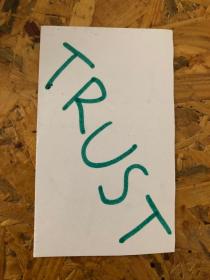
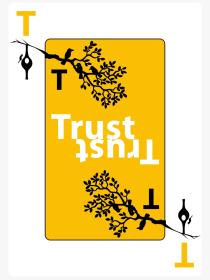
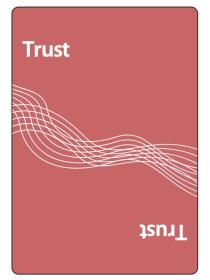
As I distributed five cards per person, I briefed our group of about eight colleagues to use their cards (after swapping, if they wanted) to share their experiences about co-creation processes. Soon enough, the group was immersed in a deep conversation about some of the stickiest issues we face when doing co-creation – and all of this prompted by the words they were holding in their hands. The feedback was clear: there was potential in the idea! Also, it could be improved by including some wild cards – with an equivalent function to a joker card in a regular set of cards – to enable less experienced colleagues to engage by asking questions (by using the interrogation mark card) or agreeing or commenting on what others were saying, by still making use of a card (e.g. an exclamation mark for agreement, a lightning bolt card for new ideas). Blank cards could also help with new concepts that had not been originally envisaged.
A final revision of words led to a 75-long list of words, complemented by about 25 wild cards, to cater to a large, diverse group. All that was needed was to agree on a design: something as simple and least evocative as possible, to leave players with complete freedom about how they would interpret their card(s). That meant that, sadly, the first design we had come up with would have to be dropped. What did go ahead, however, was having two different backgrounds for the cards, so that the game could be played with large groups of people and the cards could then easily be sorted back into individual decks.
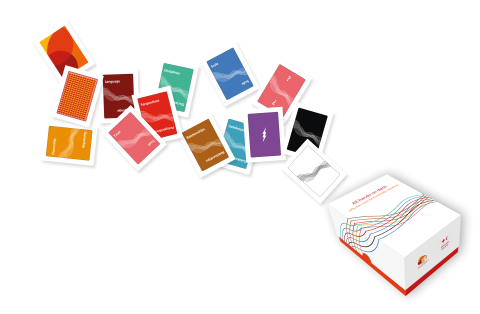
At Adaptation Futures, the cards were used to hold group conversations (of up to approximately ten people) about the different parts of the knowledge brokering spectrum. Following a presentation about CDKN’s learning to date on knowledge brokering, participants were invited to join a group and share stories about how they had overcome challenges in knowledge translation, knowledge co-creation or innovation brokering, depending on their interest, using their cards as a prompt.
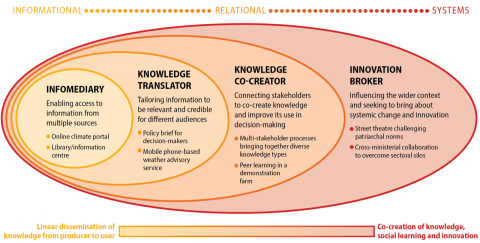
More recently, at the Community-Based Adaptation conference (CBA18, held in Arusha in May 2024), the cards were used to kick off a session aimed at furthering knowledge brokering skills and approaches. In an experiment to use the cards in a more dynamic, interactive way, they were used as a tool to surface some of the thorny issues we still need to get right for locally-led adaptation (LLA) to be effective. As participants were joining the session, each was given three cards, which they could firstly swap with any other participant and then prioritise in pairs, so that by the end of two paired conversations, each participant would be left with only one card, indicating the top thorny issue they felt needs attention for LLA to work.
The lively nature of the activity created a lot of energy in the room, as participants argued about the worth of their cards with each other. It also meant that many later visited the CDKN marketplace stall, in the hope of winning a deck. Visitors were asked to share innovative ideas about how else the cards could be used and in these fun, playful conversations, not only did we get a lot of input about how the game could be played in future, there were also ten happy “winners” that committed to sharing stories and photos with us, about their future ‘All hands on deck’ endeavours.
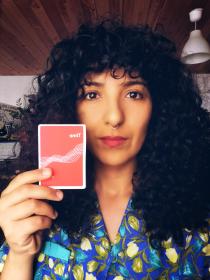
Every week, I use the "CDKN Reflection Cards for Knowledge Brokering" to embark on a journey of self-discovery. On Sunday evening, I shuffle the deck of concepts—like Time, Justice, Future, Indigenous knowledge, and Agency—and draw one card at random. This concept becomes my focus for the week. I reflect on it daily through journaling, meditation, and mindful observation, integrating its meaning into my daily life. By week's end, I summarise my insights and how the concept influenced my thoughts and actions before returning the card to the deck and preparing for a new week's reflection. This practice enriches my understanding and fosters continuous personal growth.
- Salma Sabour, Director of Science, Preserving Legacies
The number of potential uses of the cards is ultimately up to each person’s creativity and imagination – going from a tool to surface challenges, solutions or priorities, including at an individual or organisational level, to a game that can be played to share deeper reflections or conversations about what matters in our work.
We are sharing the printable files of the cards, with the printing specifications below, to encourage their use in a range of settings. We have recently tested and finalised a Latin American version of the cards (in Spanish), which include a number of additional words which resonate with the strong indigenous traditions of the continent. We will be looking into a French version in future too, for use in francophone Africa. We also keep thinking about new ways of using these, in collaboration with our colleagues at the Red Cross Red Crescent Climate Centre who co-developed the cards with us and have since used them in a variety of settings.
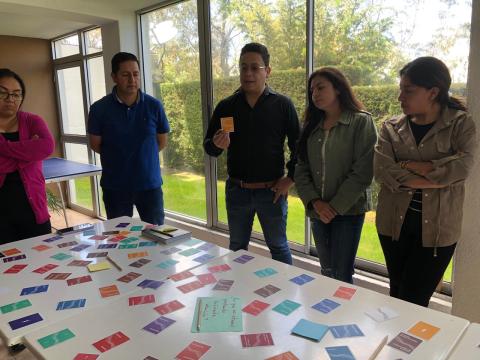
We were excited to share these with CBA18 participants working on issues as widespread as cultural heritage, jurisprudence, informal housing and green businesses, and hailing from organisations including CARE Kenya, Open Map Development Tanzania, IISD, Transitions Research and FCDO. Forty decks were furthermore recently distributed to research and practitioner teams of the Climate Adaptation and Resilience (CLARE) programme, after they used them to think about what they still need to get right for their research-for-impact activities to be effective. This was part of one of the introductory sessions of the first knowledge brokering capacity strengthening and peer learning workshop held in May in Nairobi.
Finally, the cards were also used to kick off our second knowledge brokering workshop just outside Quito in May 2024, with participants from five projects focused on food systems transformation and the promotion of agroecology in Latin America. The cards helped to explore the key factors needed to influence policy and practice in the projects' different contexts and provided a democratic, bottom-up way of establishing a common starting point regarding the various elements that participants considered critical in the knowledge brokering field.
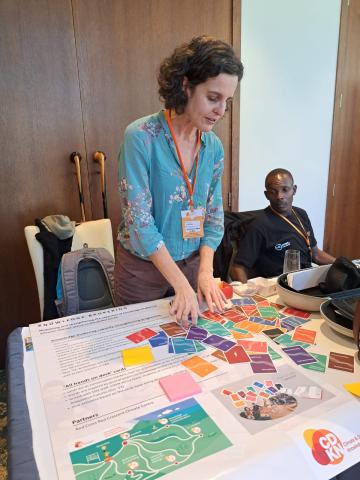
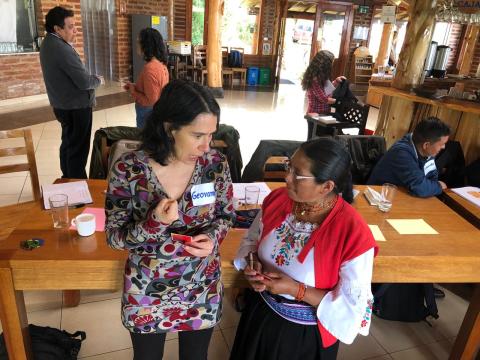
We hope to hear back from anyone who has used them, so that we can have a learning community about this and other games you may be using to create more dynamic, playful meetings that yet focus on serious issues. For more engagement on this, please get in touch with lucia@southsouthnorth.org.
Printable files and author information
- English set 1 and set 2
- English Card Box
- Español set 1 and set 2
Our recommended printing specifications are 250GSM matt laminated.
English concept by Lucia Scodanibbio with Lisa McNamara, Nadia Sitas, Michelle du Toit, Warren Turner and Bettina Koelle.
Spanish version by Lucia Scodanibbio with Margarita Cabascango, Karen Hildahl, Gabriela Villamarín, Warren Turner and Franco Moreno.
